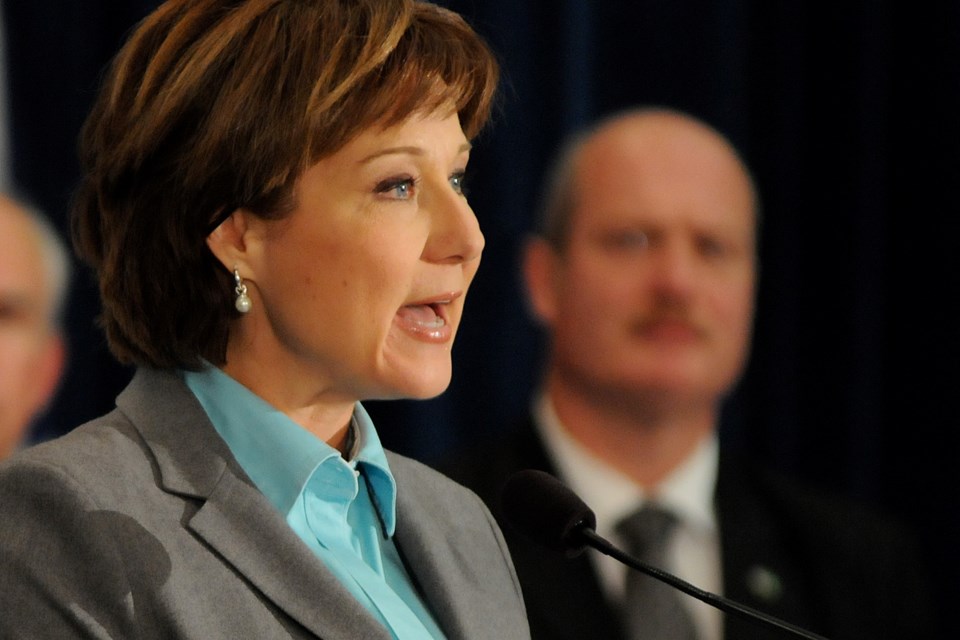“Chutzpah” is a Yiddish word that has made its way into the English language. It describes a behavioural trait best explained by a simple story:
A man found guilty of murdering both his parents, when appearing before a judge for sentencing, asks for leniency on the grounds that he is now an orphan.
In the world of politics no one is more notable in displaying chutzpah than B.C. Premier Christy Clark. And in no instance is that more evident than her dealings with B.C.’s teachers and the public education of our children.
This week, teachers’ representatives and the B.C. Ministry of Education were figuring out how to divide up the first $50 million — as part of a much larger settlement — the government has been forced by Canada’s Supreme Court to return to the public school system.
It is all a result of the court’s decision last November. That was the historically swift conclusion — during a 15-minute recess — the justices reached, overturning a B.C. Court of Appeal decision and backing the B.C. Supreme Court ruling, that the province’s Liberal government broke the law when it first shredded the teachers’ contract in 2002 removing their right to bargain for class size and composition.
Over that 14-year period, the government managed to save an estimated $300 million a year or about $5 billion in total. In that context, the $50 million is just a drop in the bucket, no matter how welcome it may be.
Meanwhile, students were more crowded in their classrooms and denied or limited in access to special needs teachers, librarians and counsellors.
Coincidentally, parents of special needs children who saw the benefits of smaller classrooms were drawn to private schools, which grew in enrolment while the public system shrank.
At the time of the original contract shredding under Bill 28, Clark was Minister of Education.
When challenged by the teachers’ union, Supreme Court of B.C. Justice Susan Griffin found Bill 28 unconstitutional because it violated the teachers’ bargaining rights. She ordered it replaced.
The Liberals brought in Bill 22 called “The Education Improvement Act.” And that was chutzpah.
Once again, Justice Griffin tossed that bill out, concluding it was “virtually identical” to Bill 28. By then 10 years had passed and Clark was now the premier.
Her government appealed Griffin’s ruling on Bill 22. And while they won at the B.C. Court of Appeal, they would lose at the Supreme Court of Canada (SCOC).
(Those curious about the legal costs incurred by Clark et al in the process can be assured it was considerably less than the billions they socked away over the years. And that is even considering the annual increases to the public education pot.)
But here is the punchline. On the weekend following the SCOC decision, CBC News managed to track down Clark for her views. Rather than accepting the government had suffered an overwhelming defeat, Clark sounded like she came away the clear winner. “It’s a chance,” she said, “for us to talk about how to invest more money in kids.”
That $50 million, by the way, came out of a $100 million contingency fund the Liberals had set aside in the event of a loss in court. You got to figure they knew the odds were not good.
When Clark’s minister of education announced the $50 million, he carried on with the good news spin, noting, “The action announced by the B.C. Government today is ensuring students benefit from enhanced learning environments now.”
It is currently estimated 1,100 teachers will be brought on board full time. Not all of those will be new hires; some will be those who are now part time. Others will be among those who were laid off because of the impact of what is now seen as the government’s illegal actions.
Vancouver Secondary Teachers’ Association president Rory Brown says the $50 million will just help school limp to year’s end. “Classes are floundering” because they are “very, very, very full.”
Vancouver’s 100 elementary and 18 full-sized secondary sites will get about 10 per cent of that money.
As for Clark’s comments about a how this is a “chance for us to talk about how to invest more money in kids”?
He dismisses them as “somewhat shameless.”
@allengarr



